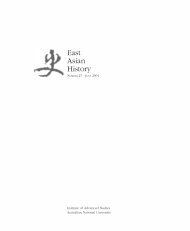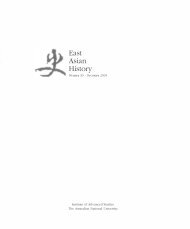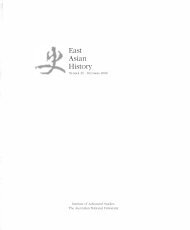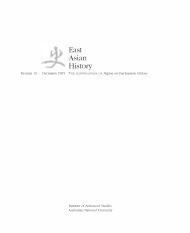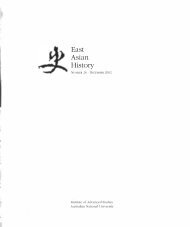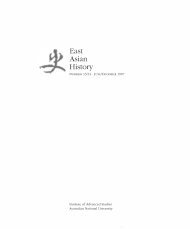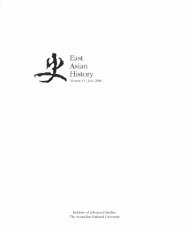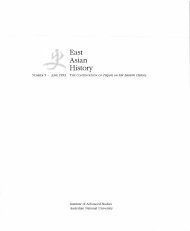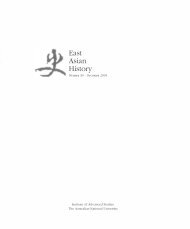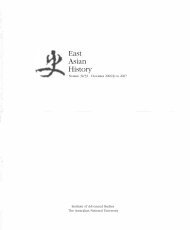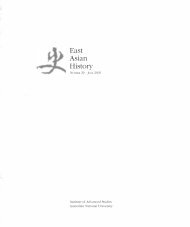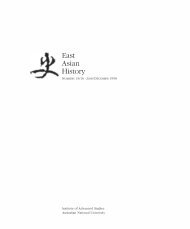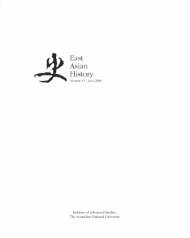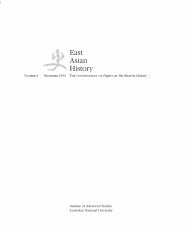Jean Francois Billeter - translated by Mark Elvin - East Asian History
Jean Francois Billeter - translated by Mark Elvin - East Asian History
Jean Francois Billeter - translated by Mark Elvin - East Asian History
Create successful ePaper yourself
Turn your PDF publications into a flip-book with our unique Google optimized e-Paper software.
<strong>East</strong><br />
<strong>Asian</strong><br />
<strong>History</strong><br />
NUMBER 9 . JUNE 1995 THE CONTINUATION OF Papers on Far <strong>East</strong>ern <strong>History</strong><br />
Institute of Advanced Studies<br />
Australian National University
Editor Geremie R. Barme<br />
Assistant Editor Helen Lo<br />
Editorial Board <strong>Mark</strong> <strong>Elvin</strong> (Convenor)<br />
Business Manager<br />
Production<br />
Design<br />
Printed <strong>by</strong><br />
Contributions to<br />
Subscription Enquiries<br />
Annual Subscription<br />
John Clark<br />
Andrew Fraser<br />
Helen Hardacre<br />
Colin Jeffcott<br />
W. J. F. Jenner<br />
Lo Hui-min<br />
Gavan McCormack<br />
David Marr<br />
Tessa Morris-Suzuki<br />
Michael Underdown<br />
Marion Weeks<br />
Helen Lo<br />
Helen Lo; Maureen MacKenzie (Em Squared Typographic Design)<br />
Goanna Print, Fyshwick, ACT<br />
This is the ninth issue of <strong>East</strong> <strong>Asian</strong> <strong>History</strong> in the series<br />
previously entitled Papers on Far <strong>East</strong>ern <strong>History</strong>. The journal is<br />
published twice a year.<br />
The Editor, <strong>East</strong> <strong>Asian</strong> <strong>History</strong><br />
Division of Pacific & <strong>Asian</strong> <strong>History</strong>, Research School of Pacific & <strong>Asian</strong> Studies<br />
Australian National University, Canberra ACT 0200, Australia<br />
Phone +61 6249 3140 Fax +61 6 249 5525<br />
Subscription Manager, <strong>East</strong> <strong>Asian</strong> <strong>History</strong>, at the above address<br />
Australia A$45 Overseas US$45 (for two issues)
CONTENTS<br />
1 A Common People's Literature: Popular Fiction and Social Change<br />
in Republican Shanghai<br />
Ng Mausang (with an accompanying essay <strong>by</strong> Geremie R. Barme<br />
and a short translation <strong>by</strong> jonathan Hutt)<br />
23 Seven Dialogues from the Zhuangzi<br />
jean Franr;:ois <strong>Billeter</strong>-<strong>translated</strong> <strong>by</strong> <strong>Mark</strong> <strong>Elvin</strong><br />
47 The Thin Horses of Yangzhou<br />
Wei Minghua-<strong>translated</strong> and introduced <strong>by</strong> Antonia Finnane<br />
67 Ku Hung-ming: Homecoming (2)<br />
Lo Hui-min<br />
97 West Meets <strong>East</strong>: Rewi Alley and Changing Attitudes towards<br />
Homosexuality in China<br />
Anne-Marie Brady<br />
121 Liberation and Light: the Language of Opposition in Imperial Japan<br />
Vera Mackie<br />
iii
iv<br />
Cover calligraphy Yan Zhenqing rouJn, Tang calligrapher and statesman<br />
Cover picture From the photograph-album of Rewi Alley: "After tiffin, Henli, August<br />
1930," Kathleen Wright Collection, Alexander Turnbull Library,<br />
Wellington, New Zealand
SEVEN DIALOGUES FROM THE ZHUANGZI<br />
<strong>Jean</strong> Franfois <strong>Billeter</strong><br />
Translated <strong>by</strong> <strong>Mark</strong> <strong>Elvin</strong><br />
I present here a selection of dialogues from the Zhuangzi fr that have not<br />
been widely quoted previously, or commented on.1, 2 They have long been<br />
left in the shadows with those parts of the work regarded as less important,<br />
not being attributed to the authorship of Zhuangzi himself but to his disciples,<br />
either direct or indirect. 3 They would, however, seem to deserve to be lifted<br />
out of this relative obscurity, and I have suggested translations here to which<br />
I have attempted to give something of the coherence, vigour, and verve of<br />
the originals.4, 5 First and foremost, though, I am proposing a way of inter<br />
preting them, being convinced that, for the understanding of texts such as<br />
these, philosophical rigour and learning are not enough. We have also to<br />
consider, or so it appears to me, the experience on which they are based.<br />
Their strangeness, in my view, is not primarily due, as one might be inclined<br />
to think, to their being Chinese or ancient, but to their being creations of<br />
1 The present study is part of a research<br />
project on the Zhuangzi made possible thanks<br />
to the help of the Chiang Ching-kuo Foundation<br />
for International Scholarly Exchange in<br />
Taibei.<br />
2 (This essay originally appeared in French as<br />
"Etudes sur sept dialogues du Zhuangzi,"<br />
in Etudes chinoises 13.1-2 (Spring-Autumn<br />
1994). Notes added <strong>by</strong> the translator are<br />
enclosed, like this one, in braces. Trans!.1<br />
3 The first seven chapters of the work are<br />
attributed to Zhuangzi (otherwise known as<br />
Zhuang Zhou HOO ), who died around 300<br />
B.CE. Some texts that are probably due to him<br />
are assembled in chapters 17 to 27 and in<br />
chapter 32, together with others that are <strong>by</strong><br />
unknown authors who were either close to<br />
Ihim or his disciples. Three groups of texts<br />
may be differentiated in the rest of the thirtythree<br />
chapters that make up the work, coming<br />
from three schools or currents of thought that<br />
were to varying degrees influenced <strong>by</strong><br />
Zhuangzi's thought. It is thought that the<br />
latest texts date from the beginning of the<br />
second century BCE., in other words from the<br />
beginning of the Empire. On these questions,<br />
see Angus C. Graham, Chuang-tzu.Theseven<br />
inner chapters and other writings from the<br />
book Chuang-tzu (London: Allen & Unwin,<br />
1981), where the various strata that constitute<br />
the book are presented and analysed<br />
separately. See also Graham, Disputers of the<br />
Tao. Philosophical argument in ancient China<br />
(La Salle, Ill.: Open Court, 1989), pp.1 72-4.<br />
Among recent Chinese publications we should<br />
23<br />
Inote Liu Ganxiao, Zhuangzi zhexue ji qi<br />
yanbian [The philosophy of Zhuangzi and<br />
its evolution! (Beijing: Zhongguo Shehuikexue<br />
Chubanshe, 1987) which uses different<br />
methods to reach the same conclusions as<br />
Graham, save in some details. The seven<br />
dialogues presented here come from chapters<br />
17, 20, 21, 23, 24, 25, and 32.<br />
4 (The translations from the Zhuangzi are<br />
therefore taken from Professor <strong>Billeter</strong>'S<br />
French versions rather than from the Chinese<br />
originals. Trans!. I<br />
5 There are two complete translations of the<br />
Zhuangzi into French. That <strong>by</strong> Leon Wieger<br />
was published in his Les peres du systeme<br />
taoiste (Hien-hien: Mission Catholique, 1913),<br />
and the series reissued in France <strong>by</strong> Cathasia<br />
and Les Belles Lettres from 1950 on is<br />
entitled "Les Humanites d'Extreme-Orient."<br />
That <strong>by</strong> Liou Kia-hway, L'oeuvre complete<br />
de Tchouang-tseu (Paris: Gallimard, 1989)<br />
was later included in the series Philosophes<br />
taoistes (Paris: Pleade, 1980). The first is<br />
often an approximate paraphrase rather than<br />
a translation and retains only a historical<br />
interest. The second is more serious but has<br />
substantial inadequacies. The best rendering<br />
into a western language is Burton Watson,<br />
The complete works of Chuang Tzu (New<br />
York: Columbia University Press, 1968).<br />
That <strong>by</strong> Graham, Seven inner chapters, is<br />
neither exhaustive nor always convincing in<br />
its details, but should be considered as an<br />
important complement to Watson because<br />
of its introduction and critical commentary.
24<br />
6 {The convention has been adopted here of<br />
using double quotes (1) for the citation of<br />
the ipsisssima verba of a writer, where the<br />
source is explicit, (2) to indicate direct<br />
speech, and (3) for titles of chapters, with<br />
single quotes for all other purposes, including<br />
the marking off of particular terms and<br />
phrases from these citations for discussion,<br />
except where embed-ding requires an<br />
alternation of doubles and singles. Transl.l<br />
7 We still have today three brief treatises <strong>by</strong><br />
him on three paradoxes. See Graham,<br />
Disputers of the Tao, pp.82-95, and also<br />
<strong>Jean</strong>-Paul Reding, Les fondaments philosophiques<br />
de fa rhetorique chez fes sophistes<br />
grecs et chez fes sophistes chinois (Bern: Peter<br />
Lang, 1985), pp.386--434.<br />
8 A historical person about whom lilLIe is<br />
known. The chapter of the Hanshu on<br />
bibliography attributes to him a work that<br />
would seem to have been of Daoist inspiration,<br />
but has been lost. In another passage<br />
in the Zhuangzi, a short dialogue at the end<br />
of chapter 28 ("Rang wang"), he is presented<br />
as a ruler who became a hermit in order to<br />
reach the Way, but failed. Other versions of<br />
this second dialogue may be found in the<br />
Liishi chunqiu [Springs and Autumns of Mr<br />
Llil (Beijing: Xuelin Chubanshe, 1984), hook<br />
21, chapter "Shen wei," vol.4, p.1454, and in<br />
the Huainanzi (Taibei: Shijie Shuju, 1974)<br />
book 12, "Daoying xun," p.195.<br />
9 Chapter 17, "Qiushui." I have used the<br />
following editions: Qian Mu, Zhuangzi<br />
zuanjian, 4th ed. (Hong Kong: Dongnan<br />
Yinwu Chubanshe, 1962), and Chen Guying,<br />
Zhuangzi jinzhu jinyi (Beijing: Zhonghua<br />
Shuju, 1983), which are convenient and<br />
trustworthy, in the first instance; and where<br />
the text presents difficulties, Guo Qingfan,<br />
Zhuangzi jishi, 4 vols (Beijing: Zhonghua<br />
Shuju, 1961), and Wang Shumin, Zhuangzi<br />
jiaoquan, 3 vols (Taibei: Academia Sinica,<br />
1988), as supplements. Since the present<br />
essay is not a philological study I have not<br />
justified my translation in every detail. Sinologists<br />
will easily see, <strong>by</strong> consulting these<br />
editions, the readings that I have had to<br />
choose between in certain places, and the<br />
choices that I have made.<br />
10 In other words he had received the<br />
education given to well-born people at this<br />
time, which was of Confucian inspiration.<br />
Ren 1= ('benevolent') and yi R ('just') are<br />
Confucian virtues.<br />
JEAN FRAN
SEVEN DIALOGUES FROM THE ZHUANGZI<br />
ten, but its waters were not increased. In the days of Tang14 there were<br />
droughts seven years out of eight, but for all that it did not shrink. Never to be<br />
in motion, either for a moment or over time, never to grow or to diminish no<br />
matter what the amount of water it receives, that is the so much greater joy of<br />
the eastern sea!' The frog felt stunned and crushed . .<br />
The frog is stupefied, as Gongsun Long had been after he had heard tell of<br />
Zhuangzi. He has had the same kind of revelation. Leaving the frog in his<br />
discomfiture, the ruler now speaks directly to Gongsun Long:<br />
"". And you, you who are not even able to tell true and false apart, would you<br />
claim to encompass within your vision that of which Zhuangzi talks? One might<br />
as well ask a fly to carry a mountain on his back, or a millipede to gallop across<br />
the Yellow River-you would not be able to! You, who are incapable of<br />
understanding words just a little bit subtle, and who merely take advantage<br />
from having the upper hand for a moment or two, aren't you like that frog in<br />
the well? At this very time Zhuangzi is treading the ground <strong>by</strong> the Yellow<br />
Springs15 or rising into the blue above. Unaware of either North or South he<br />
lets himself be carried wherever he may be and loses himself in the<br />
unfathomable. Unaware of either <strong>East</strong> or West, he leaves the primal darkness<br />
to reach the great Way] 6 And now it happens that you, in your confusion, think<br />
you can ask from him a reckoning as to this, that, or the other distinction, or<br />
catch him out in some argument. One might as well measure the extent of the<br />
sky <strong>by</strong> looking through a tube, or gauge the depth of the earth with an awlsuch<br />
instruments are ludicrous! Be off, and leave this place!<br />
The prince then mocks him further:<br />
" ". Have you not heard of the young fellow from Shouling who tried to copy<br />
the gait of the people of Handan,17 and who not only tried in vain, but at the<br />
end did not even know how to walk the way he had originally? He had to go<br />
home on all fours. Be off or else you'll forget what you used to know how to<br />
do and will lose your livelihood I<br />
In consequence,<br />
". Gongsun Long stayed open-mouthed, with his tongue sticking to his palate;<br />
then fled at a run.<br />
The author of this dialogue, who was probably a disciple of Zhuangzi,<br />
was aiming to discredit Gongsun Long, and through him the other sophists<br />
and logicians of the age. It is well-known that Zhuangzi's thought in good<br />
measure developed from contact with these thinkers, and in particular from<br />
contact with one of the best-known of them, Hui Shi m.lfffi . In its ensemble<br />
it forms a powerful reaction to this encounter.18 From this point of view, the<br />
foregoing text has a historical interest, testifying to the vigour of the debates<br />
about ideas at the beginning of the third century B.C.E. It is also a fine example<br />
of the imagination Zhuangzi and his continuators possessed.<br />
25<br />
11 'Bringing together identity and difference'<br />
(he tongyi ..g.rm) and 'separating hardness<br />
and whiteness' (lijianbailmtB) are<br />
conventional expressions that indicated discussions<br />
among philosophers at this time.<br />
The first phrase refers to the relationships of<br />
identity and difference between objects<br />
labelled with the same name; and the second<br />
to the relationships between an object and<br />
its different qualities (for example, between<br />
a stone and its hardness and whiteness). The<br />
general sense of the terms was 'philosophic<br />
quibbling'. See A. C. Graham, Later Mohist<br />
logic, ethiCS, and science (Hong Kong: Chinese<br />
University Press, 1978), pp.170-6.<br />
12 Alternatively, "Might I ask you about his<br />
method, his secret'''<br />
13 The legendary founder of the Xia dynasty.<br />
14 The legendary founder of the Shang<br />
dynasty.<br />
15 The underground world of the departed.<br />
1 6 Da long AiIll., 'the great way of communication',<br />
a term more or less synonymous<br />
with da dao Am, 'the great Way'.<br />
17 The capital of the state of Zhao, one of the<br />
great cities of that age, situated in the southern<br />
part of what is today Hebei province. Shouling<br />
was a town in the state of Yan further north.<br />
18 Cf. Graham, Dispulers ojlhe Tao, pp.176-<br />
87.
26<br />
19 Paris: Editions de Minuit, 1990.<br />
20 Franois Roustang considers these and<br />
other problems in Influence, but devotes a<br />
more systematic examination to them in<br />
QU'est-ce que l'hypnose? (Paris: Editions de<br />
Minuit, 1994). I discovered hypnosis as the<br />
result of reading Influence, and later more<br />
specialized works, as well as through discussions<br />
and a practical initiation. In my view,<br />
the three best introductions in Frenchwhich<br />
are the versions cited in this anicleare<br />
the following: Jay Haley, Un therapeute<br />
hors du commun: Milton H. Erickson (Paris:<br />
Descle de Brouwer, 1984; new ed., Paris:<br />
Epi, 1990) [in English: Jay Haley, Uncommon<br />
therapy: the psychiatric techniques of Milton<br />
H. Erickson, MD (New York: W. W. Norton<br />
& Co., 1973)]; Sydney Rosen, ed., Ma voix<br />
t'accompagnera, Milton Erickson raconte<br />
(Paris: Hommes et Groupes, 1986), a collection<br />
of texts with commentaries [in English: Sydney<br />
Rosen, My voice willgo with you. The teaching<br />
tales of Milton H. Erickson (New York:<br />
W. W. Nonon, 1982)]; and Milton H. Erickson,<br />
L 'hypnose therapeutique, quatre conferences<br />
(Paris: ESF, 1986) [in English: Milton H.<br />
Erickson, Healing in hypnosis (New York:<br />
Irwington Publishers, 1983)]. The bibliography,<br />
especially that in English, is of considerable<br />
dimensions. The basic work is Ernest L.<br />
Rossi, ed., Collected papers of Milton H.<br />
Erickson, 4 vols (New York: Irvington, 1980).<br />
21 I have not been able to locate it in the<br />
works cited in the previous note, and assume<br />
that I must have read it in some other<br />
publication on Erickson.<br />
JEAN FRAN
SEVEN DIALOGUES FROM THE ZHUANGZI<br />
What relationship is there between this story and the notions of hypnosis<br />
and hypnotic trance used <strong>by</strong> Erickson to explain how he dealt with his<br />
patients? Contrary to what its etymology suggests, the term 'hypnosis' does<br />
not indicate a state related to sleep, but a waking condition or rather, more<br />
exactly, a complex of waking conditions some of which are familiar to us<br />
while others are exceptional, or even unknown in our society. I propose to<br />
define them as states in which consciousness, though awake, refrains from<br />
intetjering with the spontaneous activity of the body-but this definition must<br />
be treated with caution. Anyone who tries to discuss hypnotic states with a<br />
certain degree of rig our immediately encounters problems of language under<br />
which lie conceptual problems. One finds oneself caught up in inextricable<br />
contradictions when one tries to take them into account <strong>by</strong> means of current<br />
notions of 'subject', 'consciousness', 'body', and 'mind', etc. The rejection of<br />
hypnosis <strong>by</strong> the greater part of the intellectual and learned world at the<br />
present day can only be explained in this way: the rejection is dogmatic, a<br />
defensive reaction in the face of data that are profoundly disconcerting from<br />
the point of view of certain representations that are fundamental to our<br />
intellectual universe. Thus no language exists today that allows us to speak<br />
adequately about hypnosis in general terms-even though the jargon of the<br />
practitioners of therapeutic hypnosis is continually becoming richer and<br />
more subtle, it is no substitute. The word 'hypnosis', which we cannot<br />
dispense with under present circumstances, is itself an obstacle to understand<br />
ing the phenomenon.22<br />
I have therefore to move forward cautiously and state more precisely the<br />
sense of my definition. By 'body' I mean, not the body of someone other that<br />
we perceive or represent, but my body, the body of whose intimate presence<br />
I am always aware. By it I mean my body such as [feel it to be23 This body<br />
manifests itself in the form of 'what's happening' or 'activities', or even more<br />
generally of activity: my body is activity.<br />
When I make myself aware of this activity, whatever its momentary form<br />
may be, I myself become the 'subject of perception'-but how are we to<br />
represent this subject to ourselves? Should we think of it as a complex of<br />
events that is exterior to the activity we perceive, and distinct from it? If we<br />
stop reasoning in abstract fashion and observe what is going on, we will agree<br />
that this 'subject' is itself activity, that it is an activity intimately linked to the<br />
activity that we observe. The consciousness that we have of our activity is a<br />
phenomenon that lies within this activity. It is a qualitative modification that<br />
displays itself here and there inside our activity with the effect that, here and<br />
there, this activity becomes in a certain fashion visible to itself from within<br />
and gives rise, with varying intensity, to that particular feeling which gives<br />
meaning to the term 'I'. In the abstract we think of the subject and the object<br />
as two separate entities, placed facing each other in a mutual correspondence<br />
but here there is no distance between them. We are also inclined to conceive<br />
of consciousness as a permanent receptacle that receives a transient contents,<br />
but now we perceive ourselves as being rather made up of a permanent<br />
27<br />
22 In Qu'est-ee que l'hypnose?, Roustang<br />
suggests defining it as a 'paradoxical waking',<br />
<strong>by</strong> analogy with 'paradoxical sleep', which is<br />
a useful clarification.<br />
23 Spinoza starts from a similar position.<br />
"The human body exists in accordance with<br />
our awareness of it" (Hine sequitur ... Corpus<br />
humanum, prout ipsum sentimus, existere),<br />
Ethiea pars 2, prop. xiii, corollarium. See the<br />
translation <strong>by</strong> R. Misrahi, Ethique (Paris:<br />
PUF, 1990), p.13. I leave to one side the<br />
philosophical discussions to which the<br />
definition I have suggested may give rise,<br />
and confine myself here to presenting my<br />
idea in a summarized form.
28<br />
24 It is evident that we are dealing here with<br />
a radical redefinition of the body. I am<br />
proposing it as a means of removing the<br />
con-ceptual difficulties that block our<br />
understand-ing of hypnosis in general and<br />
in particular the hypnotic phenomena that<br />
are implied in the dialogues in the Zhuangzi.<br />
I am also attempting to conceptualize what<br />
seems to me to be the anthropological<br />
paradigm on which the philosophy of<br />
Zhuangzi is based. I only sketch one aspect<br />
of this paradigm here. Nothing is said, for<br />
the moment, about the way in which it<br />
allows us to think about our relationships<br />
with the external world. Some indications<br />
on this subject will be found in my study of<br />
the 'Qi wu lun'. [Translated in our following<br />
issue. Ed.]<br />
JEAN FRAN
SEVEN DIALOGUES FROM THE ZHUANGZI<br />
trance is found again. We can observe in ourselves analogous phenomena<br />
every day. We spontaneously create in ourselves this kind of split when for<br />
a moment we suspend the activity of our consciousness in order to allow a<br />
memory buried deep in the depths of the body to float back up to the surface.<br />
Or again when, in order to let our imagination search for a metaphor that we<br />
need to express an intuition, we let the expressive and associative powers<br />
of the body find it for us. The same occurs when we 'reflect': we leave it to<br />
these powers to discover the relationship that we intuitively feel exists<br />
between two ideas.<br />
We thus practise hypnosis much as Monsieur Jourdain spoke prose; we<br />
enter and leave these states without even being aware of it. Other forms of<br />
hypnosis are not spontaneous but induced. The simplest form of induction<br />
consists in putting oneself in a state of repose, in a posture that favours<br />
maintaining immobility for a prolonged period, to allow oneself to develop<br />
a slow, deep breathing, to permit the development of the other natural<br />
consequences of this change in one's mode of activity,25 and to adopt an<br />
attitude of absolute non-intervention with regard to internal phenomena,<br />
which now manifest themselves to the consciousness with much greater<br />
force than do external phenomena. It is enough if consciousness limits itself<br />
to observing silently the spectacle of the activity of the body and its meta<br />
morphoses. Later on, it may, if appropriate, act upon these phenomena in a<br />
particular fashion, resorting to a sort of mild incitation. One comes across<br />
many variants of this technique in the different religions of the world; they<br />
utilize either the motionlessness of the body, or a rhythmic and repetitive<br />
bodily activity such as dancing, singing or recitation.<br />
One may put oneself into a hypnotic state either unintentionally or<br />
intentionally. The help of someone who has had experience and inspires<br />
confidence may be useful: in some cases it is indispensable. It should be<br />
emphasized that it is always a matter of assistance. In spite of what fairground<br />
hypnotists have caused people to believe, the hypnotic trance is not a form<br />
of sleep that allows them to manipulate unconscious creatures however they<br />
please. Erickson established once and for all that the hypnotist can do<br />
nothing without the consent, or indeed even the active collaboration of his<br />
subject. He has shown that the hypnotherapist can do nothing but accompany<br />
and guide his patient. His action with respect to the over-excited children at<br />
the airport was, from his point of view, effected <strong>by</strong> means of hypnosis.<br />
Instead of telling them that they had to go to sleep, which would have had<br />
no effect, he captured their attention, induced in them a disassociation, and<br />
used it to communicate with them in two registers: at one level he explained<br />
to them why he was arranging the strips of paper on the ground; at another<br />
he suggested to them that the time had come to go to sleep-and he was<br />
understood. He thus led them in the direction that they themselves felt the<br />
need to go.<br />
29<br />
25 These consequences are first and foremost<br />
that one feels increaSingly removed from the<br />
world outside, and less and less concerned<br />
with it, and this feeling is accompanied <strong>by</strong> a<br />
progressive weakening of the need to act,<br />
and even of the idea itself of action, while at<br />
the same time it feels as if the flow of time<br />
is slowing down, with a corresponding ever<br />
more intense intuition of the spatial extent of<br />
one's own body, and so on,
30<br />
26 {The original text has "un solve el coagula<br />
alchimique." TransI.l<br />
27 Erickson, Ma voix l'accompagnera, p.21.<br />
28 Thus, for example, he says: "I would like<br />
to talk to you now about the question of<br />
interpersonal communication, which is what<br />
hypnosis really consists of. And I would like<br />
you to remember the impoI1ance of this<br />
question of human communication." Erickson,<br />
L'hypnose therapeutique, p.l9.<br />
29 "It is of no great concern to me to specify<br />
when I am using hypnosis and ... when I am<br />
not. I don't have to tell you when I am using<br />
a polysyllabic word and when I am using<br />
one of two syllables. All that matters is that<br />
you understand me." Ibid., p.194.<br />
30 "I enter a trance in order to be more<br />
receptive to the intonation and the inflections<br />
of what my patients are saying. Also to train<br />
myself to hear better and to see better. I fall<br />
into a trance and forget the presence of<br />
others." Erickson, Ma voix t'accompagnera,<br />
p.60. Elsewhere he says, "when the therapist<br />
is in a state of trance he will not only suffer<br />
less from his own anxiety, he will also be<br />
more receptive to his own unconscious<br />
associations. In consequence the therapist<br />
will be much better placed to help the<br />
patient dissolve the latter'S own anxiety, to<br />
explore his internal potentialities, and to<br />
discover different ways of looking at<br />
situations." Ibid., p.32.<br />
JEAN FRANt;:OIS BILLETER<br />
This modest example illustrates one of the mechanisms fundamental to<br />
hypnotherapy. The patient's life is made painful <strong>by</strong> a pattern of behaviour<br />
that he (or she) cannot modify unaided. The therapist helps him to enter a<br />
state in which his conscious activity, that has been imposing on him a pattern<br />
of behaviour that generates anguish or pain, stops interfering with the activity<br />
of his body and allows the body to suggest a new behaviour-pattern to him<br />
that is more in accord with his real needs. A relationship imposed <strong>by</strong> con<br />
sciousness on the body is replaced <strong>by</strong> one proposed <strong>by</strong> the body to the<br />
consciousness. Either immediately, or else <strong>by</strong> stages, an alchemical dissolution<br />
and recrystallization takes place.26 Erickson helped countless people to<br />
resolve their internal conflicts <strong>by</strong> leading them to allow this transformation<br />
to take place within themselves, and so regain their freedom of action. He<br />
obviously had a concept very different from Freud's of the unconscious-or<br />
of the body, in the language I have adopted here. He saw it as the locus of<br />
all successful adaptations, of all the learning processes essential to life, and<br />
of all creative surprises. He saw in it life itself.<br />
Erickson gave various definitions of hypnosis. He presented it as "the<br />
evocation and utilization of unconscious learning processes,"27 but also as an<br />
art of communication 28 His writings are full of observations on the part<br />
played <strong>by</strong> hypnosis in everyday communication-on the states of conscious<br />
ness into which we put ourselves to communicate with others, on the double<br />
and triple registers that we use simultaneously for that purpose, on the<br />
various forms of non-verbal communication that accompany speech, and so<br />
on. He himself was a virtuoso in the art of communicating. At times he put<br />
his patients into a hypnotic state without their being aware of it. 29 He put<br />
himself into a hypnotic state when he was speaking with them in order to<br />
perceive in a more immediate and certain fashion everything that they were<br />
expressing both voluntarily and involuntarily. 30 His humour was invigorating<br />
and completely unpredictable. His followers have been more concerned<br />
about methodology and have formulated certain typical procedures. One of<br />
the commonest is the following. The therapist asks the patient to sit down<br />
and to relax. He puts him (or her) at ease <strong>by</strong> his own attitude-his posture,<br />
breathing, and tone of voice. He asks the patient to experience to the full the<br />
various sensations that this relaxation induces in him. He helps him find this<br />
letting-go <strong>by</strong> means of a regular rhythm that he gives to his own speech, <strong>by</strong><br />
deliberate repetitions, or the suggestion that he fix his gaze on a point in<br />
space the more easily to 'forget himself' . The patient falls first into a light<br />
trance and then a deeper one: he allows himself to distance himself from the<br />
external world, to which he is soon only linked <strong>by</strong> the voice of the therapist.<br />
The patient may talk to the latter if he wishes, but, in the state of deep repose<br />
that he has entered, he usually no longer has the desire to do so and prefers<br />
to respond to the questions the therapist asks <strong>by</strong> means of slight gestures. The<br />
therapist is then able, <strong>by</strong> his words, to take the patient off on a journey.
SEVEN DIALOGUES FROM THE ZHUANGZI<br />
My voice will go with you contains the complete story of such a voyage.31<br />
Erickson learned <strong>by</strong> accident during a seminar that one of his students,<br />
Kathleen, was affected <strong>by</strong> a vomiting phobia, a syndrome that is one of those<br />
psychiatrists term the 'social phobias': she had a pathological fear of contacts<br />
with others and was gripped <strong>by</strong> an irresistible desire to vomit when she had<br />
to meet them, and this provided her with a welcome excuse for avoiding such<br />
encounters. Erickson suggested that she sat beside him and, once she was<br />
in a trance, spoke to her about the penguins and sea-lions in the Antarctic<br />
and their adaptation to their environment. He called up the image of whales<br />
who feed on plankton, and so have to pass tons of sea-water through their<br />
mouths every day. Likewise the images of the sharks who filter water through<br />
their branchia in order to extract the oxygen from it. He described to her how<br />
the green woodpecker predigests the insects she catches for her fledglings<br />
and regurgitates them into their gullets, and observed that the breast-feeding<br />
practised <strong>by</strong> human beings seemed to him, all things considered, to be more<br />
convenient. Beast -feeding is a natural form of exchange with the environment,<br />
he told her, and vomiting is another, one that there is no reason to fear. The<br />
body knows when it has to vomit. Our physical reactions, he added, are more<br />
intelligent than our mental reactions. After further developing this way of<br />
thinking, in order to consolidate the change that had taken place in the<br />
patient's system of representations, he invited her to come out of her trance. 32<br />
What had happened? In her trance, Kathleen had been almost totally cut<br />
off from the outside world; only Erickson's voice was still reaching her. Her<br />
attention had been entirely directed toward the impressions, images, and<br />
scenes that had followed one after the other inside her. Thanks to the dis<br />
association characteristic of a trance, she had allowed these to unfold without<br />
interfering with them. She had regarded them as a spectacle that was alien<br />
to her even while she knew that this spectacle was emanating from herself,<br />
that it was her own memories, experiences, and desires that were on show.<br />
This distancing did not cause the spectacle to be without interest or to lack<br />
vividness, but on the contrary it made it more intense and moving. For it to<br />
come into existence, to grow, and develop its dramatic effects, it was enough<br />
that she fell into a state of trance, kept herself in it, and allowed Erickson to<br />
talk directly to her deepest and most secret concerns.<br />
What Erickson did was to appeal to Kathleen's imagination in such a way<br />
as to persuade her to regard the vomiting of which she was so frightened as<br />
a natural phenomenon, and the body that did the vomiting as an intelligent<br />
body which knew what it was doing. He then induced her to forget all that.<br />
The upheaval that had occurred during the hypnosis session would in this<br />
way remain out of the reach of conscious recall. Psychoanalysis would have<br />
required that she move back from the symptom to the trauma that had caused<br />
it in the first place, and would have made her relive this trauma. Psychoanalysis<br />
makes the cure depend on becoming conscious of this initial trauma but, in<br />
Erickson's view, it is forgetfulness that the patient needs in order to recover<br />
31<br />
31 In "Kathleen: the treatment of a phobia,"<br />
pp.S5-92.<br />
32 The French original has an appendix,<br />
omitted here, giving a fuller account of this<br />
hypnosis session.
32 JEAN FRAN
SEVEN DIALOGUES FROM THE ZHUANGZI 33<br />
The ruler addresses himself to Gongsun's imagination, and draws him after 33 I.e., 'It is of you that the story is told'.<br />
him into a deep well full of water, where it is agreeable to live. He uses<br />
concrete images to evoke the sensations that one feels there:<br />
"'When I dive into the water, the water bears me up under my armpits and my<br />
cheeks. When I walk in the mud, it covers me up to my ankles.'"<br />
Gongsun Long does not object. He lets himself be drawn into the imaginary<br />
journey that the prince has taken him on, and he allows the images to act<br />
upon him. The ruler strengthens his hold on his listener's mind <strong>by</strong> intro<br />
ducing a scene worthy of Lewis Carroll:<br />
"But the tortoise of the <strong>East</strong>ern sea had not even put his left paw in before his<br />
right knee was jammed [in the mouth of the weill, obliging him to back off; and<br />
after he had withdrawn somewhat, he spoke about the sea."<br />
Having managed to make Gongsun Long think of himself as being happy in<br />
the water of the well, the ruler suddenly expands the space in which he is<br />
immersed: this is no longer the well but the sea of the sea-dwelling tortoises,<br />
the incommensurable sea. The frog is struck dumb <strong>by</strong> the revelation of this<br />
new space, just as Zhuangzi's words had struck Gongsun Long dumb. De te<br />
Ja bu/a narratur, the ruler might have said.33 The discovery of this infinitely<br />
greater world makes the world in which he has been confined until then seem<br />
of no account.<br />
In psychotherapy the story would stop at this point. The therapist would<br />
be happy to have made a beginning <strong>by</strong> giving his patient a glimpse of a space<br />
of freedom within his reach. But, since this is a polemical text, the ruler<br />
follows up his advantage, rebuking Gongsun Long directly:<br />
"And do you, you who are not even capable of telling true and false apart, do<br />
you claim to behold what Zhuangzi speaks of? .. And are not you, unable to<br />
understand words that have even the slightest subtlety and who merely profit<br />
from this or that momentary advantage, are not you like the frog in the well?"<br />
He tells him that the spaces in which Zhuangzi moves about are immeasurably<br />
greater than the minuscule intellectual world within which he wants to<br />
confine him:<br />
"Even at this moment Zhuangzi treads the ground <strong>by</strong> the Yellow Springs, or<br />
rises into the blue empyrean. Unaware of either South or North, he lets himself<br />
be carried as he may be, losing himself in the fathomless. Knowing neither <strong>East</strong><br />
nor West, he leaves the primal darkness to reach the great Way."<br />
Gongsun Long's intellectual tools are definitely inadequate:<br />
"And now, in the confusion in which you find youself, you think you can call<br />
him to account over this or that distinction, or quibble with him over some<br />
argument or other. One might as well measure the expanse of the sky <strong>by</strong><br />
looking through a tube, or plumb the depths of the earth with an awl. Such<br />
tools are an absurdity. Be off from here!"<br />
The ruler concludes <strong>by</strong> delivering a mortal thrust:
34<br />
34 This dialogue forms the beginning of<br />
chapter 24, "Xu Wugui." It is followed <strong>by</strong><br />
another whose opening is approximately<br />
the same, but which later turns towards<br />
another theme. This latter is of less interest<br />
and I have therefore omitted it here.<br />
35 A minister of Marquis Wu, the ruler of<br />
Wei.<br />
36 Literally, "appear to be staring at the sun."<br />
37 Literally, "seem to have lost the One" (nlo<br />
wang qi yi £I:::Jt-). The commentators<br />
take this sybilline phrase to mean either that<br />
they are so concerned with what they are<br />
doing that they have forgetten themselves,<br />
or that they have forgetten the purpose of<br />
the hunt or even the hunt itself.<br />
38 Literally, "like a hook (gou friJ ). " The<br />
translation is hypothetical.<br />
JEAN FRANt,;:OIS BILLETER<br />
"Have you never heard of the young man from Shouling who tried to mimic<br />
the gait of the people of Handan, and not only failed in this but in the end was<br />
even unable to walk as he had done before? He had to go home on all fours.<br />
Be off, or you will forget what you do know, and lose your livelihood!"<br />
Gongsun Long stood open-mouthed, his tongue cleaving to his palate; then<br />
he ran away.<br />
Although this dialogue is primarily polemical, those who inherited Zhuangzi's<br />
legacy may have used it for therapeutic purposes. They may have told it to<br />
people who found themselves in distress similar to that of Gongsun Long, in<br />
order to help them free themselves from a mental universe that was too<br />
narrow and in which they were suffering from being imprisoned. The<br />
dialogue would then have served the same function as the stories that<br />
Erickson told his patients: these were often examples of sudden cures that<br />
suggested to them that they too would be cured, and that this might happen<br />
in an equally unexpected fashion.<br />
II<br />
In the first dialogue we saw the ruler practising some of the procedures<br />
that are used in Ericksonian hypnosis. We shall find some of these once more<br />
in the following dialogue. This time, it is not a ruler inflicting a somewhat<br />
heroic remedy on a philosopher in difficulty, but a hermit who visits a ruler<br />
and opens new horizons before him:34<br />
Through the good offices of Ru Shang,35 [the hermit) Xu Wugui obtained an<br />
audience with Marquis Wu of Wei. "How worn-out you look, Master," said the<br />
Marquis, to console him; "no doubt you have agreed to pay me a visit because<br />
your life in your mountain forest has become [too) painful."-"Why do you<br />
console me with such words? It is you," replied Xu Wugui, "who have need<br />
of consolation from me. When you follow your appetites and give free rein to<br />
you tastes and aversions, you are attacking the substance of your life. When,<br />
however, you curb your tastes and aversions, your ears and your eyes suffer<br />
from such treatment. It is thus for me to bring consolation to you, not for you<br />
to give me yours!" The Marquis, abashed, did not reply . ...<br />
Instead of reassuring him with pleasant words or giving him good advice, Xu<br />
Wugui leaves him for a moment to his thoughts, then broaches a topic that<br />
seems to have nothing to do with what has just been said:<br />
... A short time later, Xu Wugui began again: "Let me tell you how I judge<br />
[hunting-)dogs. Those of the lowest quality stop when they have caught enough<br />
to stay their hunger, and are no better than cats. Those of an intermediate nature<br />
put on an intimidating appearance.36 Those of the highest degree seem to have<br />
forgotten themselves .37 I am even more skilled at judging horses than dogs.<br />
Those who can move as straight as a chalked line, or in curves like those of<br />
a sickle,38 or make angles like those drawn <strong>by</strong> a set-square, and circles as if
SEVEN DIALOGUES FROM THE ZHUANGZI<br />
turned <strong>by</strong> a pair of compasses,39 are horses of whom a realm may be proud.<br />
They are not as good as those of whom the whole world may be proud. These<br />
latter have an innate capacity 40 They look haggard and distraught, as if they<br />
had lost themselves 41 They catch up and overtake all the others, leaving a<br />
cloud of dust behind them,42 in such a fashion that no one knows where they<br />
are." The marquis was delighted, and broke out laughing ...<br />
The method is the same as that we have already seen. Instead of setting out<br />
to reason with the ruler on the art of how best to conduct his life, Xu Wugui<br />
abruptly changes register and talks about dogs and horses. He awakens in<br />
him the desire for a different existence. That, for Xu, is enough.<br />
The dialogue continues outside the reception-hall:<br />
... When Xu Wugui came out, Ru Shang said to him: "I am curious to know how<br />
you set about making our ruler happy in this fashion. In the hope of pleasing<br />
him, I have given him extensive interpretations of the meaning of the Songs,<br />
the Documents, the Rites, and the Music. I have gone thoroughly over the<br />
secret treatises on the art of war 43 I have submitted for his consideration<br />
proposals that have on countless occasions led to success, but he has never<br />
even smiled once. What did you talk to him, Master, to make him so happy?"<br />
"I talked to him about the art of judging dogs and horses," responded Xu<br />
Wugui.<br />
Xu Wugui is as curt with the minister as with the marquis. His secret is to have<br />
spoken to the marquis as to a human being. To bring this home to the minister<br />
he again uses a circuitous apprach, and, to start with, a surprise:<br />
"I talked to him about the art of judging dogs and horses," responded Xu Wugui.<br />
"Was that all?" asked Ru Shang. "Have you never heard tell of the people who<br />
are exiled to Yue?, , 44 Xu Wugui asked him. "When they have been away from<br />
their homeland for a few days, they are delighted to meet an old acquaintance.<br />
When they have been away for some weeks or months, they have only to<br />
encounter someone they have seen once in their own land to be overjoyed.<br />
When a year has gone <strong>by</strong> it is enough for them to happen on someone who<br />
merely looks like their fellow-countrymen to feel beside themselves with<br />
happiness. The longer the separation, the more one feels out of sorts, isn't that<br />
the case? When someone has taken refuge in the wilderness, where brambles<br />
and creepers45 block the paths where martens and weasels scamper, and lives<br />
there alone for a long time, he rejoices when he hears the sound of a human<br />
footstep. He would rejoice even more were he [again] to hear his brothers or<br />
his parents gossiping and laughing beside him. It seems to me that a long time<br />
has passed since anyone, chattting and joking at our ruler's side, caused him<br />
to hear the language of a true human being!"<br />
By conjuring up this touching scene, he talks to him more powerfully of the<br />
ruler's loneliness than any direct language could have done. We should note<br />
that the notion of 'the true human being' (zhenren IiA), whose meaning<br />
is often problematic in the Zhuangzi, here has an entirely concrete sense: it<br />
is the person whose is neither embarrassed nor diminished <strong>by</strong> any convention,<br />
who is a whole person, and speaks to others as whole persons.<br />
35<br />
39 Some commentators regard these four<br />
comparisons as applying to the shape of the<br />
horses rather than to the figures that they<br />
execute in dressage.<br />
40 In contrast to the acquired capacities of<br />
trained horses.<br />
41 Again, "as if they had lost the One," as in<br />
note 36 above.<br />
42 Taking yi in the sense of 'overtake'<br />
and not as a graphic variant of zhe. , 'rut'.<br />
43 Literally, "The Golden Tablets and The<br />
Six Quivers." We still have today a treatise<br />
on the art of war entitled Liu tao ;t;; [The<br />
six quivers], or alternatively Taigong bingfa<br />
:;tArt [The military art of Taigongl,<br />
which is of Han provenance. It is probable<br />
that it is this work that is indicated.<br />
44 Presumably the semi-sinicized state in<br />
south-eastern China, but possibly the Yue<br />
(or Viet), non-Chinese tribes in southern<br />
China.<br />
45 The botanical identification of these plants<br />
is problematic.
36<br />
46 On the probable historical context see<br />
Reding, Fondements philosophiques, pp.296--<br />
300<br />
47 The fourth part of chapter 25, "Zeyang."<br />
48 Also known as Ji Liang. See the chapter<br />
"Weice" in the Zhanguoce [Strategies of the<br />
Warring Statesl.<br />
49 Master Hua also appears in a dialogue in<br />
chapter 28, "Ruo wang," in the Zhuangzi,<br />
that is also to be found in the Liishi chunqiu,<br />
book 21, chapter "Gui sheng."<br />
JEAN FRAN
SEVEN DIALOGUES FROM THE ZHUANGZI<br />
over territories and so never stopped fighting one another. [On every occasion]<br />
the corpses lay strewn on the ground in thousands and the victor [of the<br />
moment] pursued the vanquished for fifteen days before going back home."<br />
"Aren't you telling me drivel?" asked the king.<br />
"If you will permit me, I will explain what it means. In your opinion, is there<br />
any end to the Six Directions? ,, 50<br />
"No."<br />
"Do you realize that when one has travelled in one's mind through the<br />
Limitless, on one's return the kingdoms in which one [habitually] moves about<br />
seem [so small that they] hardly exist?"<br />
"Indeed."<br />
"Among these realms is Wei. In Wei there is [the capital city of] Liang. Within<br />
this capital is Your majesty. Is there any difference between Your Majesty and<br />
the King of Smack?"<br />
"None,"<br />
When the visitor had taken his leave, the king was bewildered, as if he had<br />
lost everything.<br />
In hypnotherapy one calls this a 'reframing'. Dai Jinren has led the king to<br />
see his own ambition and his thirst for revenge in a new perspective. He has<br />
made him understand that, no matter what advice his advisors give him, they<br />
were inciters of troubles because they confine him in his old mental universe,<br />
rather than freeing him from it. The king recognizes this at the end of the<br />
dialogue, which goes as follows:<br />
When Dai Jinren had gone out, Hui Shi [again] presented himself before the<br />
king. "That visitor was a great man (da ren 7cA )51," the king observed to him;<br />
"even the greatest sages could not compare themselves with him." "Blow into<br />
a flute," replied Hui Shi, "and you will get a fine sound. Blow onto the guard<br />
of your sword, and you will get a barely audible whistling. Everyone sings the<br />
praises of [the sage-kings] Yao and Shun, but, compared with DaiJinren, these<br />
praises are a barely audible whistling!"<br />
This dialogue ends with a powerful image. Yao and Shun were the two<br />
ancient mythical sovereigns whom Confucian teaching presented as perfect<br />
rulers, those whom every ruler should try to make himself imitate. According<br />
to Hui Shi, who ends the dialogue, they amount to nothing in comparison<br />
with DaiJinren, a sage who dwelt in obscurity. This Hui Shi is none other than<br />
the philosopher mentioned at the start of this essay when we discussed<br />
Gongsun Long. He was a minister of the King of Wei, and seems to have been<br />
a man of peace both in his political teaching and his actions. 52<br />
IV<br />
There are other dialogues that may be illuminated in a slightly different<br />
fashion <strong>by</strong> juxtaposing them with Ericksonian hypnosis. We have seen that<br />
the hypnotherapist willingly puts himself into a state of trance that heightens<br />
37<br />
50 The points of the compass, plus up and<br />
down.<br />
51 This term seems to indicate that DaiJinren<br />
belonged to a particular Daoist school some<br />
of whose texts have been included in the<br />
Zhuangzi. The present dialogue would<br />
appear to be part of this corpus. On this<br />
subject, see Graham, fnner chaplers, pp.142-<br />
3<br />
52 On this, see Reding, Fondemenls philosophiques,<br />
pp.347-50.
38<br />
53 In the course of the narrative that opens<br />
chapter 23, "Gengsang Chu."<br />
JEAN FRAN
SEVEN DIALOGUES FROM THE ZHUANGZI<br />
In what follows we see Laozi helping Nanrong Chu to escape from these<br />
dilemmas and to reach that calm of the soul to which he aspired.<br />
There is a telling detail in this passage. Normally, when I am listening to<br />
someone talking to me, I concentrate on following what he is saying. Without<br />
realizing it, I show him that I am following <strong>by</strong> giving him slight indications<br />
with my head, my eyes, my face, and my hands, etc. Without being aware<br />
of it, I also note the timbre of his voice, how he looks at me, the gestures he<br />
makes, how he carries his head, and his posture. I communicate with him in<br />
two registers, whose relationships I can alter if I want to: I can reduce a little<br />
the attention I am paying to his words and correspondingly increase that<br />
which I direct towards the bodily activity he presents when he is talking to<br />
me. One part of me goes on following his discourse, while another part<br />
becomes disengaged from this movement and is transformed into a mirror,<br />
or-rather-into a sensitive photographic plate that, being itself in a state of<br />
calm relative to the person who is talking to me, captures the moving image<br />
that emanates from that person. Now, when I adopt this way of hypnotic<br />
listening, my facial expression is not the same as it is in normal listening. My<br />
gaze no longer conveys <strong>by</strong> its movements my particpation in the ebb and flow<br />
of the conversation, but stops and rests on my interlocutor without however<br />
focussing on any particular point. Such must have been the undirected gaze<br />
that Laozi let rest on Nanrong Chu. He put himself facing the latter in a state<br />
of global receptivity; he made himself the impassive but attentive spectator<br />
of the person opposite him and at once grasped, <strong>by</strong> a kind of X-ray clair<br />
voyance, what was going on inside this person, and that gave him the power<br />
to act upon the latter <strong>by</strong> means of this inspired short-cut: "And why have you<br />
come followed <strong>by</strong> all these people?"<br />
v<br />
We shall meet this type of action again in the next dialogue. But in this<br />
case it is not a matter of a question posed unexpectedly <strong>by</strong> a sage to someone<br />
who has come to question him, and which then and there leaves this person<br />
with no wish or will to move. This time the mere evocation of such a sage,<br />
and his power to resolve confusion, is enough to produce a comparable<br />
effect. Here is this remarkable dialogue 54<br />
Tian Zifang55 was sitting beside Marquis Wen of Wei, keeping him company.<br />
As Tian had several times spoken well of a certain Xi Gong, the marquis asked<br />
him: "Is this Xi Gong your master?" "No," answered Tian, "he's someone who<br />
lives in my part of the city. I have praised him because, when I have heard him<br />
speak of the Way, I have on several occasions found what he has had to say<br />
to be of good sense." "Don't you have a master, then'" went on the marquis.<br />
"Indeed I do," said Tian Zifang. "Who is you master?" the marquis asked.<br />
"Master Shun, from <strong>by</strong> the eastern city wall,"56 Tian answered. "Why, then, have<br />
39<br />
54 The opening of chapter 21, "Tian Zifang."<br />
55 Personal name Wuze. Friend and counsellor<br />
of Marquis Wen, who ruled Wei from 424 to<br />
387 B.C.E.<br />
56 The name 'Dongguo Shunzi' indicates<br />
that he lived near the outer wall (guo ) of<br />
the capital. 'Shun' has the sense of 'following<br />
the current,' 'moving in the same direction as<br />
events,' or 'accompanying them.'
40<br />
57 Yuan yi! quande zhi junz/1 J£-i:tz<br />
-g -=f . Another possible reading is "the man<br />
who has maintained his potentiality (def!)<br />
intact." To say "how far removed from me he<br />
is" has the additional implication of "how<br />
unfathomable he is!" In classical Chinese<br />
one does not say that the sense of a word is<br />
"deep" but rather that it is "distant."<br />
58 {Latin candidus = 'shining white, fa ir,<br />
clear, honest, lucid'. Transl.l<br />
59 The second dialogue, above, ends with<br />
this zhen.<br />
60 This contrast occurs frequently in the<br />
Zhuangzi. The key text for this theme may<br />
be taken to be the dialogue between Zhuangzi<br />
and Hui Shi at the end of chapter 5, "De<br />
Chongfu," or perhaps the following formula<br />
from chapter 32, "Lie Yukou": "To know the<br />
Way is easy, but not to speak of It is hard. To<br />
know It and not to speak of It is the means<br />
where<strong>by</strong> one reunites with Heaven. To know<br />
of It but to speak of It is the means where<strong>by</strong><br />
one reunites with humankind."<br />
JEAN FRAN
SEVEN DIALOGUES FROM THE ZHUANGZI<br />
ambition can be discerned in him, no project, no personal intention, and no<br />
preconceived idea whatsoever.<br />
'He acts in accordance, while always preserving his artlessness" (yuan<br />
er baa zhen *ffijriJU: since he is not pursuing any par-ticular end, he acts<br />
as is suitable to each occasion and encounter, according to what the moment<br />
requires, and he does so without ever lOSing his freedom of action. 'Act<br />
according to circumstances' lagir selon in the Frenchl is a free translation of<br />
yuan * , which means 'to follow', as for example in 'to follow a way , 6 1<br />
'He is pure and welcomes all beings into himself' (qing er rang wu ?j1fffij<br />
$4 ): he welcomes them all without making distinctions or enforcing<br />
measures of exclusion, accepting them as they are. We should remember that<br />
the sage being described in called Shun, which is 'he who goes in the<br />
direction taken <strong>by</strong> things,' 'who accompanies them.'<br />
These few formulae define very exactly the attitude of receptivity described<br />
earlier, that of the hypnotic trance that one puts oneself into in order to perceive<br />
in depth the condition of a person in one's presence. On such an occasion one<br />
has that 'artlessness' which is the absence of calculation, one is 'as empty as<br />
is Heaven' because one has cleared out all preconceived ideas, one 'welcomes<br />
all beings into oneself' because one allows all the messages that these beings<br />
send to one either intentionally or subconsciously to penetrate into one, and<br />
one at once makes a synthesis of them. Finally, if appropriate, one spontaneously<br />
'acts in accordance'.<br />
How, though, does it happen that when Master Shun looks at 'beings who<br />
are behaving in a fashion that is contrary to the Way,' these beings 'understand'<br />
what is amiss and their 'will vanishes'? This is once again a natural pheno<br />
menon. Someone who is speaking to me and whose mind is full of what he<br />
(or she) is saying unconsciously transmits signals to me that inform me about<br />
his state of mind and his intentions 62 He expects me to transmit similar<br />
signals back. He needs these partly for reassurance, and partly to gauge the<br />
impact on me of what he is saying, so that he can reorientate it in response<br />
to my reactions, and so on. If, however, as I listen to him, I put myself into<br />
a state of deep receptivity, in other words into a state of hypnotic trance, I<br />
will have plunged into complete relaxation and will have stopped emitting<br />
the reassuring signals that he is expecting of me. Feeling the basis of<br />
communication slipping away beneath him, he may be struck with a hidden<br />
giddiness and stop. Subliminally aware of my attitude of non-participation,<br />
his own strategems may suddenly seem absurd to him, and he may forthwith<br />
abandon a game that no longer functions 63 "He understands, and his will<br />
vanishes," says the Zhuangzi. Beings who 'behave themselves in a fashion<br />
contrary to the Way' are thus those who have not abandonded their 'will',<br />
whose minds remain darkened <strong>by</strong> their calculations, desires, or fears, and<br />
who in consequence see neither what is happening within themselves nor<br />
what is happening around them. The 'Way' seems to be a form of activity that<br />
a human being attains when he or she stops exerting his or her will.<br />
41<br />
6 1 The inspiration comes from some lines <strong>by</strong><br />
Rimbaud: "Donc tu te degages / des humains<br />
suffrages, / des communs elans! / Tu voles<br />
selon L . . J." ("You thereupon leave behind /<br />
Plaudits from humankind, / Commonplace<br />
passions! / Flying with circumstance [ . . . J."<br />
Trans!.} These occur in "Alchimie du verbe"<br />
in Une saison en enfer.<br />
62 These signals were discussed earlier in<br />
this essay and are today described collectively<br />
as 'body language'. Gregory Bateson and<br />
others have shown that this language is a<br />
necessary complement to verbal expression.<br />
It has the function of a metalanguage <strong>by</strong> means<br />
of which we show those to whom we are<br />
talking what our intentions are when we are<br />
talking to them, and hence the sense in which<br />
we want them to take our verbal messageswhether<br />
as orders or as suggestions, as disingenuous<br />
or ironic comments, as truths or as<br />
lies, and so forth. It can happen that our bodylanguage<br />
berra ys us and sends a message that<br />
contradicts the verbal message. On phenomena<br />
of this sort see G. Bateson, R. Birdwhistell,<br />
E. Goffman, E. T. Hall, et a!., (texts assembled<br />
and presented <strong>by</strong> Yves Winkin), La nouvelle<br />
communication (PariS: Seuil, 1981).<br />
63 Psychoanalysts sometimes have the<br />
occasion to observe this sort of wordless and<br />
instantaneous conversion. Fran
42<br />
64 This dialogue occurs at the start of chapter<br />
32, "Lie Yukou," but may also be found in<br />
the Liezi, chapter 2.<br />
65 That is, Liezi, Master Lie, the figure who<br />
appears in a number of passages in the<br />
Zhuangzi, and to whom was later ascribed<br />
the authorship of the Liezi, an apocryphal<br />
work of the fourth century CEo See<br />
A. C. Graham, The Book of Lieh-tzu 0960;<br />
rev. ed., New York: Columbia University<br />
Press, 1990).<br />
66 Liezi's master. At the end of chapter 21<br />
there is a description that has become famous<br />
of his giving his pupil a lesson in shooting<br />
with a bow.<br />
67 Free rendering of cheng , 'sincerity'.<br />
'Goodwill' or 'the desire to do good' give a<br />
better sense of what is at issue in the present<br />
context.<br />
JEAN FRAN
SEVEN DIALOGUES FROM THE ZHUANGZI<br />
like bearing, which he still retains within himself, will continue to show itself<br />
externally and attract people in crowds. The story confirms this as it proceeds:<br />
Some time later, Bohun Wuren went to Liezi's house and saw the ground<br />
outside the door covered with sandals. He remained standing, his face toward<br />
the north, and his cheek creased <strong>by</strong> the staff on which he was leaning. Then<br />
he left without saying a word. Alerted <strong>by</strong> his doorkeeper, Liezi snatched up his<br />
sandals and ran after him barefoot, catching him up <strong>by</strong> the door [of the<br />
courtyardl:<br />
"Since you've come here, don't you have a solution for me?"<br />
"No point," replied Bohun Wuren. "I warned you people would throng<br />
around you and here they are, thronging. This is not so much a proof of your<br />
ability to attract them as of your inability to stop them crowding in. There's no<br />
sense in turning your own nature upside-down in this way. It is not the people<br />
who surround you who will warn you [of danger]. Their chattering is nothing<br />
but poison. Why do you associate with them? They understand nothing and<br />
comprehend nothing. People of skill waste their energies; people of intelligence<br />
torment themselves; but the man without abilities looks for nothing. He eats<br />
his fill, and goes hither and thither, drifting off like a boat that has slipped its<br />
moorings. He is empty, and goes where chance takes him.<br />
VII<br />
Last of all, a particularly engimatic text. In the first dialogue we found<br />
Gongsun Long in a state of deep anxiety because he had heard someone<br />
speaking of certain things that Zhuangzi had said. In this last tale it is<br />
Zhuangzi himself who is shaken. The text seems to preserve the memory of<br />
a crisis that he underwent and which may have been a decisive moment in<br />
his life. This is A. C. Graham's hypothesis,68 which I have in my turn adopted.<br />
The Zhuangzi has fifteen or so anecdotes, varying in their degree of<br />
detail, where Zhuangzi appears in person. Some of them contain short<br />
conversations that he may in fact have had, in particular with his friend Hui<br />
Shi, and which he may well have recorded himself. Others are most probably<br />
based on his sayings and doings, but their form clearly reveals that they are<br />
stories transmitted and written down <strong>by</strong> his disciples. The text that follows<br />
has a unique quality that obliges us to put it into a separate category. There<br />
is an irrational element in it, possibly resulting from a dream, that could only<br />
have had a meaning for the person to whom it happened, and this thus gives<br />
it a seal of authenticity. It is also the only text in which a disciple of Zhuangzi<br />
is mentioned <strong>by</strong> name, and this furnishes a supplementary indication that it<br />
is genuine. We can imagine either that Zhuangzi attached some importance<br />
to recording the name of the disciple with whom he had spoken when this<br />
crisis struck him, or else that it was the disciple who made a note of their<br />
discussion. The first of these two alternatives seems the most likely. We<br />
should note that if Zhuangzi had a disciple at the time that this happened,<br />
43<br />
68 Graham, Inner chapters, pp.117-18, and<br />
idem, Disputers of the Tao, p.l76.
44<br />
69 Graham, Inner chapters, p.1l7.<br />
70 Penultimate part of chapter 20, "Shanmu."<br />
71 Wang qi zhen ZA literally means<br />
'forgetting what was true in it,' or 'what was<br />
truly proper to it.' The word zhen, 'true', has<br />
here the particular meaning given to it <strong>by</strong> the<br />
school of Yang Zhu, and indicates a person's<br />
life, the most precious thing that that person<br />
possesses. (Cf. A. C. Graham, Disputers 0/ the<br />
Tao, p.57.) Wang qi zhen thus means that 'it<br />
was forgetful of its life', or 'forgetful of itself.<br />
The expression has the same sense as the<br />
parallels wang qi shenZA and wang qi<br />
xing ZAffg in the preceding sentences.<br />
72 Wu gu xiang lei4[9]f§ literally means<br />
'beings are linked the one to the other'; the<br />
fate of one is linked to the fate of the other.<br />
73 One reading takes this as 'three months',<br />
but this does not fit well with the qingjian<br />
tOO 'after some time' or 'not long afterwards'<br />
of the next sentence.<br />
74 Shou xing '
SEVEN DIALOGUES FROM THE ZHUANGZI<br />
that he too is caught in this fatal chain, and that at the very moment he is<br />
aiming at the magpie and thinking himself master of the situation, some<br />
unknown being whose presence he has not noticed is lying in wait for him,<br />
ready to pounce. He throws away his weapon, takes flight, and discovers with<br />
terror that the guardian of the park has spotted him and is chasing after him,<br />
cursing him roundly.<br />
Why did this misadventure have such an impact on him? Why did he<br />
remain upset <strong>by</strong> it for three days? Because he had realized that, as he said,<br />
he had allowed his mind to be "darkened <strong>by</strong> things." His mind darkened <strong>by</strong><br />
the thought of his prey, he had permitted himslf to "forget himself," just like<br />
the cicada, the praying mantis, and the magpie. It seems to me that this<br />
discovery would not have perturbed him as much as it did if he had not<br />
glimpsed through it something more fundamental. He must have grasped that<br />
consciousness when 'darkened <strong>by</strong> things' or <strong>by</strong> a thing becomes there<strong>by</strong> a<br />
form of unconsciousness. Consciousness of a thing precludes the conscious<br />
ness of other things as well as of oneself, which necessarily makes it a form<br />
of "forgetfulness of oneself." In a dangerous world that, too, is a trap: somone<br />
who is aware of one thing is there<strong>by</strong> blind to all the rest and can at any time<br />
become the prey of the dangers that are lying in wait for him.<br />
It must have been in this particular fashion that in the park at Diaoling the<br />
limits of consciousness were revealed to Zhuangzi. He must on the instant<br />
have grasped that the feeling of mastery that it conveys is an illusion, because<br />
it is never anything but a phenomenon of a secondary kind, a glow of light<br />
standing out against the blackness of surrounding night. At that moment he<br />
must have had the fundamental intuition on which his philosophy is based,<br />
or one of these intuitions.<br />
This interpretation agrees with that proposed <strong>by</strong> A. C. Graham 75 In his<br />
sketch of the probable path followed <strong>by</strong> Zhuangzi he suggests that he may<br />
have had the Confucian education that well-born young men of that time<br />
received, and which instilled in them the duties associated with their rank,<br />
the first and foremost of these being to serve their ruler. Later on Zhuangzi<br />
would have adhered to the ideas of Yang Zhu, who called on the members<br />
of the ruling class to question themselves about these obligations, and to ask<br />
whether or not it was in their personal interest, or indeed even in the general<br />
interest, in an age where intrigue, treason, and violence reigned everywhere,<br />
for them thus to place themselves at the service of the state. 76 During one part<br />
of his life Zhuangzi himself probably propagated these ideas. Later, following<br />
the crisis of which we probably have an account in the story of the magpie,<br />
he would have begun to develop his own philosophy. It is still in his early<br />
role as a master in the school of Yang Zhu that he appears in this text.<br />
A. C. Graham has identified several terms that are characteristic of the<br />
Yang school, and whose presence supports his thesis. 77 When Zhuangzi cries<br />
out, in the dialogue, "my gaze was deep in muddy water that I thought was<br />
clear!," he is using an image that figures prominently in a short treatise from<br />
75 Graham, Inner chapters, pp.117-18.<br />
45<br />
76 On this important movement of ideas,<br />
see Graham, Disputers of the Tao, pp.53-64.<br />
This would explain the presence in chapters<br />
28-31 of the Zhuangzi of a corpus of texts<br />
that reflect the positions of the school of<br />
Yang Zhu rather than those that Zhuangzi<br />
later developed. Even after he had changed<br />
his orientation it may have been the case<br />
that the adherents of the Yang Zhu school<br />
continued to regard him as one of their<br />
members, and thus rightly or wrongly<br />
attributed to him certain texts that were<br />
circulating amongst them, texts that were<br />
subsequently incorporated into the Zhuangzi.<br />
77 See Graham, Disputers of the Tao, p.176.<br />
These are, notably, zhen. in its sense of<br />
a person's 'life' (see above, note 71) and<br />
xiang lei ;t§ , the 'beings linked <strong>by</strong> a<br />
chain the one with the other' (see note 72).<br />
As to shou xing «fif1 , 'obsessed <strong>by</strong> things'<br />
or 'preserving one's body' see note 74<br />
above.
46<br />
78 "It is in the nature of water to be clear, but<br />
when mud makes it turbid, its clarity is not<br />
apparent. It is in the nature of a human being<br />
to live for a long time, but when external<br />
matters disturb him, this longevity does not<br />
come to be. Things should serve to nourish<br />
his nature, and not his nature to nourish<br />
[otherl things." See Liishi chunqiu, book 1,<br />
chapter "Ben sheng."<br />
<strong>Jean</strong> Franr;:ois <strong>Billeter</strong><br />
Facuite des lettres<br />
Department de langues et litteratures<br />
mediterraneennes, slaves et orientales<br />
Universite de Geneve<br />
CH - 1211 Geneve 4<br />
Switzerland<br />
JEAN FRAN



